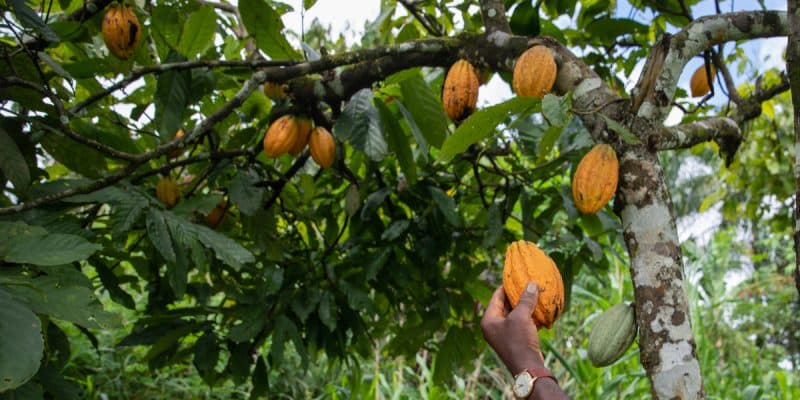In Cameroon, the introduction of agroforestry techniques is giving good results in the cocoa sector. Farmers produce while preserving forest ecosystems. This is the approach developed by the Green Innovation Centres for the Agro-Food Sector (ProCISA). An initiative supported by the German development cooperation agency (GIZ).
While the three main African cocoa-producing countries (Ivory Coast, Ghana and Cameroon) favour monoculture and the extension of plots, the African cocoa platform supported by the German development cooperation agency (GIZ) promotes the cultivation of trees in and around cocoa orchards. The use of agroforestry systems is part of a sustainability approach, in other words, cocoa production without deforestation. This is the approach taken by GIZ in Cameroon, through the Green Innovation Centres for the agri-food sector (ProCISA). The aim is to develop sustainable agricultural practices, in particular agroforestry, a technique that consists of combining agriculture and forests.
The implementation of activities related to sustainable agricultural practices and specifically related to productivity and agroforestry could make existing plots of land profitable by having both agricultural and forest products. At the end of the chain, it is a question of having cocoa that respects sustainable development standards. The activities focus on the densification of cocoa farms with a stake in the landscape, through the repopulation of native and agroforestry trees such as fruit trees. Emphasis will be placed on restoring soil fertility with agroforestry trees and producing the moisture necessary for cocoa development.
Two young Cameroonian cocoa farmers awarded
The approach promoted by GIZ was the subject of a competition launched in June 2022 to award the best cocoa-based agroforestry systems. The aim is to highlight the contribution of trees to forest and land restoration and climate change impacts through carbon capture. Following the selection process of ten applications (including two women) in August 2021, two cocoa farmers emerged from the lot. These were Thierry Abagno Daheu (first prize in the competition), aged 38, a member of the Tonga Cocoa Producers Cooperative Society (SOCOPROCATO) and Rainforest Alliance certified since 2012, and Philippe Belinga Edjina (second prize), a member of the MbangaSud cooperative in the Mbangassina district.
Thierry Abagno was selected as part of the evaluation of his 1.5 hectare cocoa farm, which contains mango, safoutier, mandarin, guava, orange, avocado, cheese and kolatier trees, and has specific objectives. “This makes it possible to diversify income and protect the field from the sun. With the shade trees, the field is fertilised and there are fewer capsid attacks,” explains the cocoa farmer. The development of this plot, the model of agro-ecological cocoa farming, allows him to harvest about four tonnes per season.
Read also-
Philippe Belinga Edjina’s approach is further characterised by the presence of trees with medicinal value in his 1.25 hectare plot, which is in the process of being certified as “organic agriculture”. This is the case of the izop tree, which is used to make certain medicines for body massage and soap. It is also used to purify palm oil. The same is true of fraké, whose leaves and bark are used to treat typhoid. All these strategies aim to diversify producers’ incomes and ensure better living conditions while preserving the environment for the well-being of present and future generations.
Boris Ngounou







